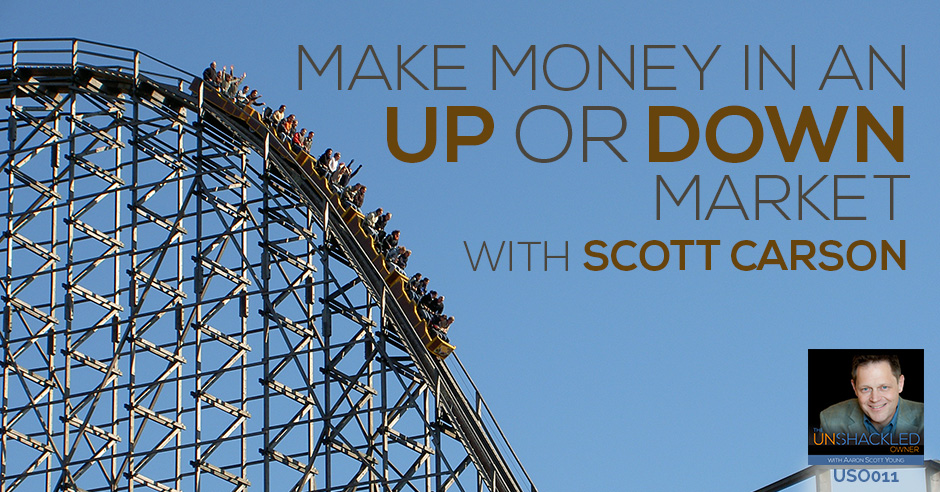
This episode’s guest is Scott Carson of We Close Notes. He talks about how he made money in an up market, but more importantly how he found a way to make money in a down market. Scott illuminates the importance of being creative and thinking outside the box to get back up from rock bottom, and shares his view on you can do in your business to become an unshackled owner.
 Scott Carson (aka “the Note Guy) has been an active real estate investor since 2002 and solely focused on the note industry since 2008 where he buys and sells non-performing mortgages on residential and commercial real estate directly from banks and hedge funds. His common sense approach to note investing has helped thousands of new and experienced real estate investors add notes to their portfolios to either expand their
Scott Carson (aka “the Note Guy) has been an active real estate investor since 2002 and solely focused on the note industry since 2008 where he buys and sells non-performing mortgages on residential and commercial real estate directly from banks and hedge funds. His common sense approach to note investing has helped thousands of new and experienced real estate investors add notes to their portfolios to either expand their
Scott is the CEO of WeCloseNotes.com and the creator of the Note Buying for Dummies workshop that focuses on the 3 F’s of Note Buying…The Find, Fund and Flip. He has purchased over half a billion dollars in distressed debt for his own portfolio and purchases assets in over 30 states across the United States.
He is a highly sought after speaker on distressed debt and was the 2014 Note Educator of the Year winner from the 28th Annual Noteworthy Convention. He has also been featured in numerous newspapers including Investor’s Business Daily, The Wall Street Journal, and Inc.com. He has also spoken at the National Association of Realtors National Convention, The National REIA Cruise and real estate investment clubs all across the country. When he isn’t traveling, teaching, or buying assets you can find him home in Austin, Texas.
Tonight Scott is going to share with you how he helps thousands of investors become LIENLORDS instead of LANDLORDS and how you can also start investing in “turning problem properties into profitable solutions.”
Listen To The Episode Here
Make Money In An Up Or Down Market – Interview With Scott Carson
Hey, everybody. This is Aaron Young. Welcome to The Unshackled Owner, the podcast where we teach you everything you need to know to build a business that’s bigger than you, build a business that becomes a real asset, not just a glorified job. One of the things that I love to do is to bring you great people, friends of mine, associates of mine, who are living the life that most entrepreneurs only dream of. We’ve got a great guy that we’re going to introduce you today to. His name is Scott Carson of We Close Notes. What We Close Notes is all about is Scott is an expert, really the leading voice in the whole country of how to buy and sell underperforming and nonperforming real estate notes. In other words, the mortgages that the banks hold or that hedge funds hold. Not only is he the guy that’s doing this on a huge level, but also training people so they can become a really successful real estate investor. That’s who we’ve got here today to teach us all about how we can become even more unshackled by learning how to create other streams of income. Scott, are you there? Welcome to the show.
Hey, Aaron. I’m here, glad to be on the podcast. Thank you so much for having me. When you put it that way, I’m blushing a little bit here. It’s hard to believe, I guess I am the nation’s authority in what I do.
Let me tell you, embrace it, because I’ve talked to other people that are in your industry and everybody acknowledges Scott Carson. Just full disclosure folks, Scott and I are friends. He does a lot of events throughout the year and he’s generous enough to invite me on as a guest speaker to talk to his students because he has a tremendous education platform, all the way from weekly free webinars on Monday nights. What are those called?
We call those The Monday Notes. We’ll have anywhere from 200 to 600 people watching those and taking part of those every Monday night.
You do a daily Facebook live presentation so people that follow you, you’re giving them up to the minute information about things they need to know in the note business.
It’s my little morning rift. We usually last 15 to 20 minutes long, just little topics to get people motivated throughout the day and to share what we are doing here at WCN on a daily basis.
Folks, I want you to listen to this. Scott, when I first met you, you were doing all these live events all over the place. I was travelling often to different cities around the country. Then you said, “God, this is killing me. I think we can do this virtually.” Tell us a little bit about that.
I was like a lot of people in the real estate world, teaching workshops. We were travelling and we were doing probably about twelve, thirteen workshops a year or events a year. For anybody who goes out and publicly speaks knows that there’s a lot that goes into it, of speaking in investment clubs or speaking at other people’s events to drive traffic to those. Our main goal is not to sell education. Our biggest goal is to help people buy assets because that’s where we make the majority of our money, is buying these defaulted dead assets. But you still got to put people in the seats to do it.

Up Or Down Market: Travelling and working all the time, it tends to get old really fast.
When you’re looking at your Southwest Airlines frequent flyer miles and you’re over a million points, you’re hitting your preferred status within the first three months of the year and you’re averaging almost a flight a week, it gets old really, really fast. Not to mention just the logistics of putting on so many events. Hotels and travel, making sure the speakers are coming in and printing. Don’t get me wrong, being single, no kids, I had a lot of fun travelling the country. But like Aaron said, it tends to get old after the first, second or third year.
I realized, there’s got to be a smarter way of doing it because we were doing these webinars every week and getting a good amount of people on. I said, “Let’s just toy with the idea of making it something completely virtual.” I guess there’s a $7 billion industry either now or in the future of online training. We decided, “Let’s give it a try.” We did our first event in August of over a year ago, two Augusts ago, we had 75 people join us for three full days. It was so much easier, I got to sleep in my bed at night, eat my own food. The overhead was just a fraction of what it was to put on a hotel event. The students were a lot more interactive, they saved money from not having to travel. We were like, “To heck with putting on a class workshop anymore.” For the last year and a half, we’ve been doing these virtual workshops and event these big virtual conventions now. I think we’re probably the leaders in the industry when it comes to that with what we do and what we provide. I would tell you this, it has unshackled me a lot.
That’s right. That’s the whole idea. I tell you what Scott, let’s go back in time just a little bit, so people know. We know each other, we could have just a fun chat. Tell us a little bit about the history. How did you get started? You didn’t come right out of high school and become an entrepreneur, I don’t think, did you?
I always had the entrepreneur background. My dad was entrepreneur growing up. I had that influence because my dad owned the local hardware store and always opened his own shop and worked for himself. Growing up, I was always doing odd jobs, working for electricians or plumbers on the weekends or roofing in the summers. I always had an entrepreneurial bug in me. I went to college and got a business degree and focused on business management and marketing. Out of college, I went to work for Verizon Wireless. I got into banking and got into financial advising and being a mortgage banker. I tried real estate investing. A lot of people, I watched a lot of shows on TV with my wife at the time, I was married before. We decided to dip our toe in the water and we failed. I bought a couple of houses and then I got laid off of my job. It was a very messy time. I really got kicked to the teeth and was able to pull my assets out of the sling and started working back in finance. We started to recover, started paying our bills on time. Because I was facing bankruptcy, I was facing foreclosure.
How long ago was this, Scott? How many years ago was this?
I graduated college in 2001, we bought our first house in 2002. Basically, 2003 through 2005. It was basically two years.
You jumped in and it just didn’t work. You didn’t know enough about what you were doing yet.
That’s exactly right. I thought the fact that I could build a house, knowing how to build a house from the bottom up, from working, was the way to do it. I didn’t have the education, I didn’t have the training, I just failed. I licked my wounds for a while. A buddy of mine that I’ve worked with before came to me, was starting a mortgage company with a couple other real estate investors and educators that taught the note business. I remember, July 4th 2005, I put my notice at JP Morgan Chase, where I was a vice president, and made the leap of being a full time mortgage broker. Did that for a while but I was able for three years basically to apprentice with this amazing educator who taught the note business, the owner financing and distressed mortgage business.
Be a little more specific. That note business means exactly what?
The note business, it’s basically create a finance is a better way to put it. If you’re a real estate investor and you’re looking for financing, we would help structure things, either doing your traditional mortgage from a bank or working with the person that own the house to owner finance the property to you to create a mortgage and then sell that mortgage off to a Boston note or a New York hedge fund that would pick it up and the owner would walk away with cash and just get creative with it. He also dabbled in the distressed mortgage game. He was a mortgage company beforehand, he had stuff that went south, he had a line of credit that had these mortgages on it that he was responsible for that he had to sell off to pay back the Wells Fargo and the other companies that had given him his line of credit.

Up Or Down Market: In 2009, when everything hit the fan, I called the lenders to start buying this distressed debt.
For three years, I learned basically every in and out of creative financing when it comes to real estate investing. I still had the mortgage company, working on it. But then in 2009, when everything hit the fan with all these banks going under, things like that, I saw the writing on the wall. I jumped ship, I sold my interest in my mortgage company to my buddy and started full time just calling the same banks and lending organizations that I was getting mortgages from. I called them to start buying this distressed debt and started recording what I was doing, started recording it with video and stuff like that, my failures, and teaching people. I started getting these phenomenal deals at huge discounts because the banks and lending institutions just wanted to get this distressed debt off their books at a fraction of what they were owed.
I want to ask you a question. First of all, I hope everybody that’s listening is hearing a big takeaway that just was said. Scott said, “I’m out there, I’m making money selling mortgages, helping people get mortgages.” Then the crash comes. Now, most of us that were in the real estate business, when the crash came, we all just went and cried in our soup. “Oh, I’m losing all this equity, I’m losing all this value.” What Scott Carson did was said, “Hey, people make money when the market is going up and when the market is going down.” You went from talking the banks into accepting these packages, a mortgage package for some borrower, saying, “Let me buy those packages back from you at a discount,” because the banks and the hedge funds want to get them off their books.
Exactly, especially when you have values that tank or people stop making payments, it becomes a huge liability to these banks. Me buying them, I can be a lot more creative with the people, the borrowers on there to try to keep them in their house or just have them give me the property, which is worth still something, substantially more than what I paid for the debt.
This is so huge. I don’t want to go rifting off too far off the trail here. Here’s the thing, a bank makes a loan and they say, “We’re going to loan, whatever, some dollar amount,” a million dollars or $200,000 or whatever the number is. The person’s paying away and of course the bank’s collecting all these interests. They’re getting most of their profits upfront. Then the market crashed. Maybe somebody was in a brand new loan or maybe they’ve been in that loan for ten or fifteen years but they lost their job or now the equity went way down or whatever happened. The bank says, “We can no longer value the loan at the same place. The property’s not worth as much and these guys can’t pay it. This is a huge liability. We’re carrying it as a big liability. It’s bad debt. We’re not going to get paid on this.” Because the fact is, it’s still a house and there’s still a human who wants to live in the house. If you could come in and basically reset the table and now instead of it being a $200,000 loan, you bought it for $40,000. Now, $40,000, it’s a whole new ballgame for that borrower, for the person in the house.
The house is only worth $100,000, they’re way upside down. I come and say, “Listen, let me forgive you 50 grand of debt or 100 grand of debt and you can start making the payment. If you don’t want to stay, then just give me the property back and I’ll let you walk on what you owe.” Now, I’ve got an asset there that I could either sell it, keep it as a rental or sell it to somebody else who can finance it.
What was for most people, most novices, guys like me in real estate, because I made a lot of money when the market was going up. I still am sitting on a house that I couldn’t sell that we finished building right before the market crashed. I still own it. I’m still making payments on it. What you do is your business really took off in the devastation of the real estate crash.
Exactly. We turned a lot of lemons into lemonade, is the way to look at it.
Kept people in their homes.
Instead of trying to rehab the property, we focused on rehabbing the borrowers.
You got going, things started working, you saw this opportunity, you started charging into and buying debt and renegotiating or saying goodbye. I know sometimes you guys even pay people to leave the house just so they don’t destroy it or whatever, make it easy for them to move. You got going and things started growing. Was it mostly just you doing it?
I had a business partner at the time. When we first started, we worked really, really well together, and then things go the way they go a lot of times. We decided to stop working together. I still liked what I was doing. She was a realtor locally here in Austin and she decided just to go the route of being an agent because it was a little bit more steadier income that way than what we do with the notes. When you start off, as everybody will know, it’s peaks and valleys a lot of times. We apart our different ways. I actually made a decision, really rough decision because I’m in Austin, Texas. For most real estate entrepreneurs, they like to invest in their backyard.
What I was finding was that most of the deals I was buying and these lists that banks were sending me were all across the country. Very little in actually Austin, Texas or Texas itself. I literally sold everything, I sold my houses. I sold everything except my dog. I now gotten divorced, flash forward a few years, I’ve been through worst for a couple years. I just jumped on the road and started travelling across the country to do two things. Not only get the word out, because what I was doing was such a niche. It was also a way for me to expand my market to actually go see these cities, to meet investors in these cities, to help me develop my, I guess you could say my down line. When I got listed, I can move them to these people, these investors. I literally started travelling nonstop for almost three years all across the country.
How was that working? Were you being that profit? When you’re getting disciples following you, you had all kinds of people, were you starting to make money at it?
I was making money, yes. I was making very good money at it. The education came from, because people, “Hey, would you teach us?” The education evolved from there. I was making great money. We were closing on portfolios anywhere from a single asset up to 300 assets in a big pool and working with other investors and taking down. I don’t know if I want to say the right thing, profit, but I guess you can say it was like a note cult. Not the Kool-Aid, without the Kool-Aid.
I’m saying just a profit. A guru. My point is that, when you have something new and nobody’s really heard of it, the results are, because they’re unfamiliar, they’re almost too good to be true, but then people see the proof in it and everybody wants to follow you.
That’s exactly right. I let my deals be my talk. I walk the walk basically. I’m out here taking videos. I’m in front of this property in San Antonio, I’m in front of this condo in Miami that I picked up for a nickel and it’s worth this. Or I would talk with another student who bought this asset in North Carolina or this condo in Michigan that I picked up for $500 and I sold it for scrap metal the next day for $1500. There’s a whole bunch of different stories that happened along the way and people that I helped make money along way, along with putting money in my pocket. I worked my ass off. Literally, I was working eighteen hour days. But I was so passionate about what I did, it wasn’t like work. We would market and teach people and I would go from one city to the next or I’d fly across country to go speak somewhere. At a point, I was a very professional circus performer of spinning plates as a one man show.
That brings me to this question. You’re going along, you’re traveling, you’re speaking, people are starting to look to you as a teacher and a guru, you’re buying things. You’ve already described a variety things of that we wouldn’t normally think of. Buying condo and sell it for scrap metal, I’ve never thought of that before. The point is, you’re doing all that, was there ever a place where it all kind of like converged and just like you hit a wall? “Oh my gosh, this is wiping me out,” or something. What was that wall? This is the thing I want the listeners to think about. This is what’s unique about this podcast, is there’s a lot of people out there who can make money, drive a nice car, live in nice place. But most entrepreneurs are such hands on, I don’t want to say control freaks, except I just did.
We are.
But invariably, people will hit a wall. I wonder what your wall was.
My wall was when I wanted to start dating somebody full time, because I’d been divorced for a little while.
Have a life.

Up Or Down Market: When I wanted to have a life, that’s when I realized, I didn’t want to travel.
Exactly. I wanted to have a life. I didn’t want my vacation was flying to California and getting to spend like three hours having fun at a ball game and I have to jump on a plane the next day. When I wanted to have a life and have some personal Scott time versus the note guy time, that’s when it really started to hit. I realized, I didn’t want to travel. I needed an office some place I could go because I was tired of juggling FedEx shipments of collateral to the point I really needed to hire somebody. I’ve had a few assistants that had helped out and they would run their course for six or eight months and then they would go do something else. Finally, I said, “I’ve got to change what I’m doing.” Yes, is this fun for a while? It is. But my health started to deteriorate, I was working way too much, I was putting weight on and I just really had no resemblance of a normal life. Living in hotels is only fun for so long.
I know that story too. Tell me, you saw this thing, you hit this wall, you want to be dating somebody, you’re falling in love, whatever the story is. You thought, “I got to do it different.” What did you do? I heard you say you got an office and you got an assistant. What did you do to start to turn that around? Did you have a team? What did you do to start rethinking how the note guy can be the note crew or the note team?
I started looking, because I had a group of very, I would say loyal and very friendly students who do an amazing job. People I talk to, they became family. They’re my note family. I became closer to them than I am with my own family to the point where they started noticing things. “Scott, you don’t look like you’re sleeping much, you look like you’re stressed out. Can we help?” I’m like, “Yes.” I started delegating things to people and adjusted my training to include a mastermind where we would get together three to four times a year and really spend three to four days working on each other’s businesses or five days really helping each other out and stuff. That was really the first thing. I started that mastermind. It freed up a lot of stuff and allowed for us to have feedback on each other’s businesses. Like it helped me with different vendors or I helped them with different vendors. It took away a lot of the spinning plates and replaced them with stuff that was just solid and streamlined a little bit.
Let me ask you a quick question on that mastermind. This is interesting. What I think I just heard you say, and I want to get clarity on it, you’re working, you’ve got all these students that love you, they notice that, “Boy, our buddy Scott, our teacher Scott seems pretty tired and doesn’t seem like his old self. What can we do to help you?” They come to you and one of the things you said, “Let’s start a mastermind group.” Everybody that’s listening out there, listen to what I think I heard, you charged people for that mastermind group?
Yeah. I had to pay for my time. Even though it was great to meet with them, it was still very valuable because I would bring in deals to the table for them. I incentivized them to be a part of it. I charge them but I also incentivized it by bringing deals to the table and expanding their own network and really opening up the door. I would literally give them my Rolodex. “Here’s my list of asset managers or here’s a list of everybody in here so you can network with them.” It’s the whole Google model. Actually, I was reading What Would Google Do?, if you remember the book that came out about that. Google has expanded their network by giving away their source code and opening up for platforms. I read that, I’m like, “Oh my gosh, this is what I have to do. I’ve got to open up. I can’t control everything. I have to give away control.”
I gave away the list, which my list are worth a ton of money because they’re spent cultivating these relationships and making millions of dollars with these asset managers that nobody else sees. Also the relationships with everybody else, my down flow of people that I’m selling assets to, giving those away to everybody else in the group. It was literally such an amazing thing because it took a lot off my plate, it took away a lot of the work that I really didn’t need to do and it opened up for a lot more clear communication with my students and myself. I realized who were really loyal. My students who’re now my friends and my family now who are really loyal, who would do anything for me and I would anything for them. It really became a family versus a paid internship or paid holiday, if that makes sense.
It does make sense. The thing that is the big magic that I heard you say was, you were in this situation, you’d hit this wall, you’re trying to rethink how to do your life. People saw that you’d the hit, they came together. You said, “Let’s do things differently,” and you started this mastermind group, which did a few things I would guess. One is it created some predictability about schedule, it created some new revenue. And by you opening up, as they say, opening the kimono, everybody could start to collaborate and it actually reduced the number of plates you had to spin. Most of us that are out there struggling are thinking we have to do it all ourselves, we have to pay everybody to do everything or we have to have a big group of our people if we’re going to fulfill on something to a client.
In the last interview that I did, as related to raising money for your business, the guest, Bill Kelly, talked about, sure, you can raise outside investment capital but you can also go to a customer, somebody who would want to buy your product, which is what you did Scott, and partner with them to provide the money for you to create the thing they need. That’s what you did, your people bought into a mastermind, you opened up your knowledge base and everybody prospered together. But it’s unusual thinking, no different than taking that condo and selling it for scrap metal, like you said a minute ago. Too many people think transactions are just one way. There’s just one way to do a deal, but there’s not. There’s a ton of ways.

Up Or Down Market: If I got a problem, what’s the solution to come up with this? How do I fix this?
There’s a multitude of ways. I think it’s one thing I’ve always been blessed with, is having a very creative, outside the box thinking. I look at problems, I’m like, “If I got a problem, what’s the solution to come up with this? How do I fix this?” I’m very good at saying no to things because I don’t want to overwhelm my plate with things because I have enough stuff going on. If there’s something I think is really going to be beneficial to something, there’s more ways than just writing a check and being just a win transaction. If I can create a win-win scenario with my student, it’s even better. It works so much better and not only does it build camaraderie, it also builds trust, it also builds in some rapport with people that if I am falling down on something here or something pops up, they’re usually the first ones that pop up. “Hey, how can we help, because we want to help?” It’s a giving nature too. I’m like, “Hey, let me give to you guys.” When I need something, they’re more than willing to jump on the phone or help me out with anything I need.
Just to review a little bit and summarize, you figured out you were growing long, you were doing it all yourself, running your tail around the country. You’ve decided you wanted to have a relationship that forced you to think differently. Thankfully you already had a dedicated group of people that wanted to follow you. We’ve talked about your mastermind group, we’ve talked about going from being a road warrior to doing things virtually, workshops and now even conventions virtually instead of running around from hotel to hotel. Did you start adding team members or are you still doing it all yourself?
I think labor is always a tough thing. The good thing, most of my deals are outside of the state, so most of my students are outside of the state or outside of Austin anyway. I started adding team members. I brought on a VP of operations, which she evolved from being an assistant to really taking on a lot of the load. Then we’ve added other people as we could, because I was still travelling quite a bit up to the last year. Now, we’ve added staff on that are handling a lot of the marketing. We’ve taken time to help out with that. Don’t get me wrong, we still have a lot of things we are working on and we’ve always got projects on, but it has helped because now I’ve noticed exponentially things are getting done. We still have our ups and downs like any other entrepreneur out there. It is amazing to be able to walk in to an office, think an idea, say it, get interrupted and come back and your staff is, run with it, implement it and it’s better than you thought it was going to be when it came out of your mind.
The biggest thing I think with our staff is I’ve always been the big fan of, how can I help them achieve things? What are they focused on? What do they want to accomplish? I have an open door policy and I have a 30 second bitch session. If we’ve got a problem, we got 30 seconds to gripe about it, but then let’s move on from that. You try to hire people for their strengths and delegate the weaknesses if you can. Every one of my staff has a different strength. Some are strong at other things, others are weak so I try to get them focused on their strengths. It makes them a whole lot more productive. We try to have fun. That’s the biggest thing. If you can laugh and have fun at your job, it makes life a lot easier. But also have caring side. If somebody’s going through something rough, “Hey, what’s going on today? Do you need to take some time off? Do you need to take the afternoon to go do something?” I think so many bosses or entrepreneurs, when they have staff, they’re so focused internally on what they got going on, they don’t take the time to notice what’s going on with their staff. Not every person is motivated to get that paycheck for 40 hours. Some need other things. You know what I mean, Aaron?
I do. What I love is that you’re covering so many things. I teach The Unshackled Owner Class. So many of the things that you’re talking about are, and I want everybody to hear this, so key. You had a clear vision. You don’t dabble around in a lot of other stuff. You do what you do, is that true?
Totally true.
You work on your thing.
I am so laser focused on the note business, that’s all I focus on. I get bombarded with people sending me, “Hey, what about these type of deals or these types of deals or this or that?” Every week, I say no to people because I’m like, “Listen, I’m focused on this. I want to be an expert.” I have my father’s voice in the back of my head when I hear that. Being a jack of all trades equates to a master of none.
It’s right. You have to get a clear vision then you brought in great people, you told them about the vision. You said, you delegated your weaknesses to other people who had strengths and you empowered them and you build a culture, a culture of trust, a culture of advancement, a culture of, “Come on in, get whatever off your chest. You’re not going to get in trouble for telling me what you’re upset about, but then let’s find a solution and move on.” Folks, this is why I bring people like Scott Carson on to the program, because they’ve figured out this system. I see it over and over again in companies that are making money and where the owners have …
I see Scott, I see you doing a lot of fun things in your life. Let me just ask you, just before we go to the last part of the interview, the bullet points, I want to ask you. This is called The Unshackled Owner podcast. My belief is that an unshackled owner isn’t an owner who’s sold the company or isn’t an owner who is no longer involved with their business. It’s an owner who the business will, in my opinion, it’s a business that will function if the owner is there every day or has to be gone for a couple of months or wants to put effort out to another project but they’ve got a team. That’s my opinion. When you hear the word unshackled, how do you perceive that? What’s your opinion or perspective on what it would mean to be unshackled or live an unshackled life?
I would agree with part of that comment. I don’t think it’s somebody selling off their business and sitting with their toes in the sand every day. Because I think if you’re a true entrepreneur, you could only sit on a hammock drinking piña coladas for so long.
You go crazy. You go out of your mind. You start figuring out, “How can I manufacture hammocks?”

Up Or Down Market: You’ve got to have a staff that can operate without you.
Exactly, or how can I make a better piña colada umbrella? I’m that same way. I go stir crazy. Don’t get me wrong. I love sports, that’s my way to unwind, I go to sporting events a lot and games and do that stuff. But I think unshackled, it comes in a couple of ways. One, you’ve got to have a staff that can operate without you. Am I in the spot where if I stepped away for two months, would things run okay here? Probably not quite there yet but we are working to it. It’s a battle every day. It is not something that happens overnight.
That’s right. It’s not a turnkey.
Exactly. Don’t get me wrong, there are things that I can delegate when I’m away now, which is nice. I just went to Baltimore for a day and a half and spoke there. My staff did a tremendous job while I was gone, working on things. I was gone for a week in Orlando for our mastermind, or ten days, and my staff did a great job of working on other things. It’s something you work towards. My VP of operations has been off for a couple week, just dealing with individual stuff. That’s worked pretty fine. It’s something that you work towards. The bigger you get, you do have more babysitting issues if you don’t empower your employees. I think you’ve got to give some flexibility. I tell my staff all the time, “Listen, if you see something or if you got a complaint from a client and it costs less than 100 bucks to fix it, just fix it. I give you leeway. If you would need to refund something back or fix it, just fix it and move on.” Eventually, that’ll go to 500 bucks and eventually, that’ll go to 1000 bucks as my staff becomes more familiar with everything and as they grow. We try to get them moving to think about not what Scott would do but what would they do to best solve an issue. Unshackled is being able to take time away to be yourself. Unshackled is also having some semblance to a life I think is a big thing.
How has your life changed since you decided to bring on the team, start to empower people, start to do things more virtually, start to remove some of those things, how is your life different for you now?
I tell you what, I took my first official true vacation in about four years where I literally turned the cellphone off and we took a seven day cruise. That was great, did that for my birthday end of May last year. That was the first time. Things went fine, everything went perfect with that. That was a big thing. We’ve already planned another one, another two vacations this year to do that. Because I feel very comfortable with my staff taking care of things for a week or two while I’m gone. Having the virtual aspect of what we do and spending more time marketing properly versus the old adage of, “Let me go out and speak somewhere and talk to 20 people or 100 people,” when I could stay here in Austin, do the same thing but use technology to get the word out. Instead of I’m speaking to one to 100, I’m speaking to one to 1000 or to 5000. We’ve been much more focused on that. That has helped alleviate time away from the office. I’m not taking my computer home every night. Saturday and Sundays, I rarely check my emails. Little things that allow us to do things.
Little things but it changes your life.
It does.
That’s the whole point. You have to make that happen. It doesn’t happen automatically, it’s done by intention, it’s done through planning. Anyway, long story short is, that’s how you become unshackled. We’re going to ask Scott Carson a few critical things that we want to get a quick answer on. Scott, you ready to go through quick several little bullet points here and get some quick answers from you that’ll help our listeners?
I’m ready, man. I got my gun cocked.
First, we’ll start with an easy one. Is there a book that you recommend to people when they’re just starting off in business or one that particularly inspired you? This is like the first book you recommend to people.
I’m going to share two real fast. I think a lot of people have read Rich Dad Poor Dad, which is great, but I think there’s a couple of better ones. One is The One Thing that Gary Keller released about a year and a half ago.
Great book.
I think a lot of entrepreneurs try to do too many things at once and they never get them completed in a timely fashion. I call it the philosophy of the unfinished bridges where we try to create things and we end up pissing our time away. If you can get one thing done and complete it, it’s much better than trying to do 20 things at once.
Great one. That’s great takeaway.
Another one that I’m a huge fan. You know this, it’s written by Sharon Lechter and the late Napoleon Hill, called Outwitting the Devil.
Oh my gosh, great book. Why do you love that book?
I love it because of the main concept where it talks about how entrepreneurs and people drift. It’s a book that was written in 1938 by Napoleon Hill. His wife wouldn’t let him release it because it had him basically having a conversation with the devil. She thought it too crazy at the time, in ’38, to publish it. It came out just a few years ago.
Two years ago.
I think they’re making a movie out of it. Sharon Lechter was brought on, Sharon is the coauthor of Rich Dad Poor Dad and a friend of ours, to add her part to the story that Napoleon Hill wrote in 1938. She did great job of just leaving Napoleon’s words there, talking with the devil and why is the devil so successful. In this book, he talks about the fact that those that do so much good out there, those that achieve success are the ones that don’t drift as much as everybody else. Because let’s face it, we all have distractions, from TV to music to games. Our lives are full of distraction.
Facebook.

Up Or Down Market: Those people that are the most successful are those that are the most laser focused.
Facebook. Oh my gosh, social media. We are setup with distractions. Those people that are the most successful are those that are the most laser focused and can remove those distractions from their life. They don’t drift. If they’re focused on getting something done, they strive through until they complete it. I think that book is, in some places, it’s a little dry. We give away so many copies of this. Everybody says, “Oh my God, this book changed my life. This was the best book I’ve ever read because it hits that point.” I have a copy here right next to my desk all the time.
I actually have one right next to my desk too. I’m looking right at it.
Same here. I’m like, “Am I drifting this week? What am I focused on? What do I got to get done today before I drift?” Let me make sure I get the most major, the three or four things that I have to get done, let me get that done before I drift and I go onto something else and have a little bit of fun.
Or the one thing that I got to get done.
Exactly. What’s the most important thing? Once I get that done, what’s the other thing?
You’re right. Gary Keller: what’s the one thing that if you did it, would make everything else either easier or unnecessary? Those are great books and actually both of them are sitting right here on my bookshelf in my office. It’s no wonder that we’re friends, we have the same taste. If you could go back in time and do it again, what would you change in your life, in your quest? What would you do differently with your business if you could go back?
If I could back, I would probably write a few more checks. What I mean by that is I probably would’ve, instead of trying to do stuff myself, I would’ve just written a check to have somebody else do it.
Delegate it out, hire it out or hired a coach maybe or a mentor, something like that.
Definitely a coach. I’ve got coaches, I’ve got mentors, I’ve got masterminds I’m a part of. But I would’ve probably, instead of thinking I could do it myself, I would’ve gone back and say, “Hey, write a check for this. You don’t know what you don’t know.” It’s better to get counsel than advice. I would’ve paid for counsel faster than advice.
Who knows? Maybe it’ll be the same thing. Favorite quote or song lyrics? Some people, it’s a song lyric.
You don’t want me singing here on the podcast. We don’t want people’s ear bleeding.
You can speak it or if it’s some other quote. What’s something that maybe that goes up on the wall or you find yourself saying it to people a lot in a speech. What’s your favorite quote?
My favorite quote is from Ralph Waldo Emerson. I’ve had this as the email signature for years. “Do not go where the path may lead. Go instead where there is no path and leave a trail.” One of my favorite quotes. Song lyrics, I’ll give you this one. This is a song that popped up, it’s by Gary Allan. It’s the song, I’m Right Where I Need To Be. It’s a great song. I won’t sing it here, we’ll save everybody’s eardrums. It’s a great song. One of my favorites. I probably play it ten times in a row every time it pops in my iPod. People are like, “Oh my God Scott, can you please change the damn song?” Ralph Waldo and Gary Allan.
Right Where I Need To Be. As we leave now, as we end our discussion Scott, do you have any parting, we don’t give advice, we give counsel. Parting counsel to the people that are listening who are thinking, “Here’s a guy who went out. He made lemonade out of lemons.” There are a lot of people out there who are trying to figure out, “How do I make this work or how do I start even?” What counsel would you give to people that are listening that want to learn how to be an unshackled owner?
Two things. One is definitely, be yourself. There’s too many people out there trying to be somebody else, they’re trying to dress the same or act the same. We’re all different for a reason. God made us individuals. It’s okay to be yourself. If you’ve got a witty humor or a little bit … It’s better to be yourself than trying to be something that you’re not because you’re going to struggle with that. The second thing is, I think the most successful people are the most approachable. They’re also the people that are most willing to give you counsel and help you avoid pitfalls along the way, help you turn that six month learning curve into 60 days or six weeks. If you’re trying something new or you’re dealing with something, reach out to somebody who’s been where you’ve been or somebody that you look up to. Because I’m willing to bet, most of the time, they’re willing to take your phone call or email or spend some time with you one on one.
I had a very good fortunate time during my darkest two years, back in late 2002. I was fortunate enough, I went to a Tom Hopkins seminar here. Tom, the master of sales. It was a day long thing. I had to basically steal the money to go to it for the day, had to call in sick to work to make it to it. It was a great event, all day long. Listened to Tom Hopkins and another guy talk. At the end of the day, the hotel here in Austin, at the Hilton, traffic was horrible at five o’clock so I decided just to go the bar in the hotel and just sit there for a little bit and wait for traffic to die down. In walks Tom Hopkins by himself. He goes to the bar, these two realtors get up and walk away and there’s two chairs at the bar and Tom sits in one of them. I’m sitting 20 feet away just staring like, “Oh, somebody should go up and say hi to Tom. Somebody should go buy Tom a drink.”
I’m just sitting there shaking. I could literally remember shaking. Finally, after about ten minutes of nobody else doing it, I get the huevos enough to walk up to Tom and introduce myself. I said, “Tom, can I buy you a drink?” He’s like, “Oh yeah, that would be great. I’d love a glass of red wine. You know what, why don’t we find a place where we can go sit and talk just by ourselves?” Here’s this young kid who’s going through the worst financial crisis of his life at the time and he thinks the world’s ending because he didn’t know if he’d had enough money to pay for the drink for Tom. I got to spend an hour with Tom one on one, nobody interrupted. That was a life changing moment of going up and asking, just to say hello, him taking time out of his very busy and probably exhausted day to spend time with a young kid. I can’t say that enough. I get phone calls all the time from people asking questions. I’m always glad to give time to help people avoid pitfalls or avoid mistakes so they can find success a whole lot faster and learn from my mistakes.
First of all, it’s a great story and it’s a truth. Here’s the deal, I’ve interviewed Tom Hopkins before on my radio show. I see the way people love you. I have my own version of it when I’m out speaking at some place. We’re all just regular people. We’re just like regular people, I’m a goat farmer from Amboy, Washington. It’s not very glamorous. The point is that people are accessible. A lot of times, they’ve been at that lowest spot like you described and they want to help somebody else who’s at a lowest spot or who’s trying to really learn. How can people, how can they get a hold of you? What’s the best way for them to reach out to you? I will make sure we add that on the show notes too. What’s the best way for people to reach out or to learn about what you’re doing? What would you like them to know?
The best way to get a hold of us is just go to my website, WeCloseNotes.com. If you want to learn about the distressed note game, we’ve got hundreds of videos on my website and on YouTube. My email is very easy, it’s just Scott@WeCloseNotes.com. If you want to learn more information, what I’ll do, if you drop me an email and mention The Unshackled Owner podcast, I’ll be glad to send you a 52 page eBook on the topic. That’ll give you a good chance to learn some of information and some of the tricks that we use in real estate and other things like that too.
I love it. Scott, thanks for being here with us today. Guys, we’ve been listening to Scott Carson and Aaron Young talking about how you can make lemonade out of lemons, how you can make money in an up or down market, in a crashing real estate market, how you can rethink how a transaction works and make a fortune and become an unshackled owner. That’s the end of episode for today. Thanks for being here with us. Make sure you share the podcast, you tell people about it, go over to iTunes or to Stitcher and write a review. Let’s pass the word around. Let’s get people here and let’s help people build a business that becomes a real asset, not just a glorified job. Thanks for being with us here Scott, and everybody else today, on The Unshackled Owner.
Links Mentioned
- AaronScottYoung.com
- The Unshackled Owner Twitter
- The Unshackled Owner Facebook
- Aaron Scott Young LinkedIn

